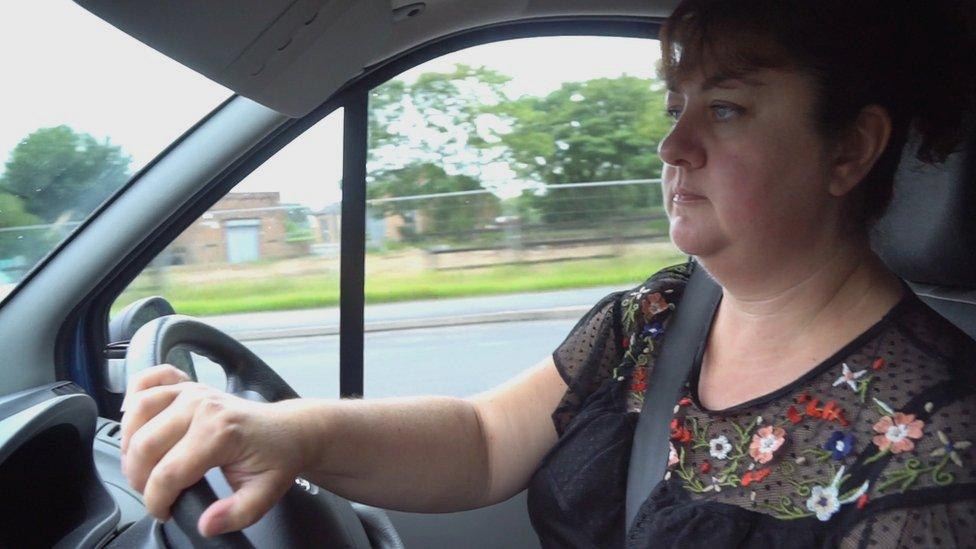Disabled child travel cuts 'force parents to work less'
- Published
Christine has been forced to quit her job to take her disabled son Christopher to school.
Parents of disabled children say they have quit jobs or cut their hours because of problems with the school transport system.
Almost half (48%) of those surveyed by the charity Contact said travel arrangements for their child had affected how long they work.
Contact said its research showed the council-funded system was "in crisis".
The Department for Education said it would review its guidance to local authorities to ensure it is clear.
'Stressful'
The Local Government Association told 5 live Investigates that councils were working hard to ensure suitable travel arrangements are made for disabled children but that it was becoming increasingly difficult in the face of "sustained financial challenges".
Almost a quarter (23%) of the more than 2,500 parents and carers surveyed by Contact said that their child's journey to school was "stressful" and impacted their ability to learn.
The same percentage of families said they had been refused free transport when they asked for it.
Local authorities in England and Wales are legally required to provide free school transport to children under 16 with special educational needs and disability (SEND).
In Scotland, local authorities have the power to make their own arrangements.
Contact also found that more than half of the local authorities they studied in England were publishing misleading or unlawful guidance.
Una Summerson, the charity's campaigns manager, said: "This is totally unacceptable.
"Some parents told us that they're paying more than £500 a year for school transport when they could in fact have that for free.
"That's having a devastating impact, and causing real financial hardship for families."
A Department for Education spokesman said: "In light of the findings by Contact, the department will review the statutory guidance for local authorities to ensure it is clear."
'Life-changing impact'
Christine Anderson says she was shocked when her disabled son's school transport arrangements were changed without warning.
Christopher, 15, has learning difficulties and a complex range of physical conditions, including spina bifida, sleep apnoea, and adrenal insufficiency.
He attends the nearest suitable special school, 30 miles from the family home in Thornton-Cleveleys, Lancashire.

Christopher, 15, suffers with sensory overload and felt overwhelmed with the presence of a younger noisy child
"I know Christopher and I know the limits we can push him to, and I just feel like it's ripped us all apart," said Christine.
"We are doing everything to keep him well and then somebody goes and makes a decision that has a life-changing impact for him and the rest of the family, with not a thought."
For two-and-a-half years he had travelled to school in a taxi accompanied by an escort, but last September, Lancashire County Council said the driver would be collecting two more pupils en route, adding 30 minutes each way to Christopher's daily round trip.
As Christine explained, the extra journey time and presence of a noisy younger child overwhelmed her son, who struggles with sensory overload.
Despite making efforts to adapt, he soon found the situation unbearable.

Christine spends around two hours a day driving to take her son to school
"He was coming home really frazzled and stressed and that meant our whole evenings were written off, the weekend was written off. He couldn't cope with the thought of going to school because he needs quiet and calm.
"So we gave it a second week. By the Wednesday, he was refusing to get up for school and I couldn't get him out of the door and couldn't get him to sleep at night. And that's a really difficult situation.
"Any stress and anxiety affects his health, so he started to get unwell."
Yet although Christine had supporting letters from the family GP and specialists at Alder Hey Children's Hospital in Liverpool, the council has refused to reverse its decision for the last 12 months.
They have now promised a review after the case was taken up by 5 live Investigates.
In the meantime, Christine has been forced to resign from her job and now takes Christopher to school herself rather than jeopardising her son's health.
Contact's findings come months after England's local government ombudsman said there had been a "marked increase" in complaints about school transport decisions in 2015-16.

5 live Investigates: School Transport for Disabled Children is broadcast on BBC Radio 5 live on Sunday 10 September at 11:00 BST - or catch up on the BBC iPlayer.
Have you got something you want investigating? We want to hear from you. Email 5liveinvestigates@bbc.co.uk